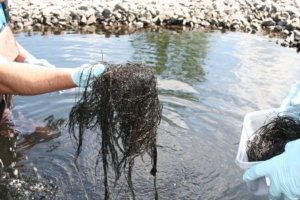Contaminants from pharmaceuticals, antibiotics, and steroids are becoming increasingly common in surface and drinking water sources, having an effect on human and aquatic health. To reduce this pollution, researchers at Penn State University have developed a filtration system that removes contaminants from hospital wastewater.

“Biogenic manganese oxide-coated coir fiber collected from the coal mine drainage treatment system in Glasgow, Pennsylvania.” Source
One researcher on the team, Bill Burgos of Penn State, said that hospitals may be contributing at least half of the contaminant load to regional wastewater treatment plants. They are difficult to eliminate because they are diluted, but still pose a risk due to their high potency.
Their team chose to try to destroy these compounds through chemical oxidation. They picked manganese oxide because it is nonselective and highly reactive with organic compounds, making it perfect for hospital wastewater.
The team obtained MnOx-cotated fiber from a nearby metal removal unit and wastewater samples from Penn State Health Milton S. Hershey Medical Center. Their results showed that the fiber filters were effective at removing contaminants, showing that 21 out of 36 pollutants were removed by over 94% in 24 hours.
Next, the team hopes to reduce the treatment time, test a flow-through configuration, screen different biogenic MnOx sources, and conduct field studies.
Original article from Jennifer Matthews
